
Question Number 88372 by mr W last updated on 10/Apr/20
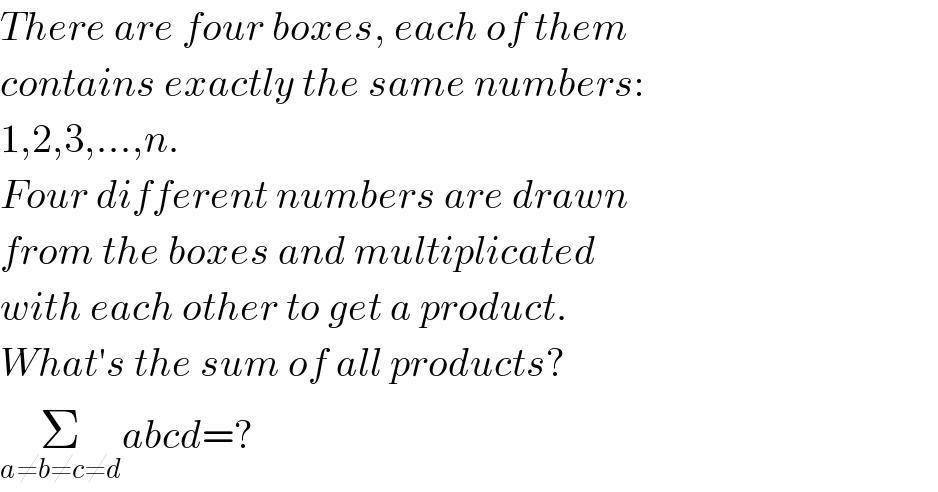
$${There}\:{are}\:{four}\:{boxes},\:{each}\:{of}\:{them} \\ $$$${contains}\:{exactly}\:{the}\:{same}\:{numbers}: \\ $$$$\mathrm{1},\mathrm{2},\mathrm{3},...,{n}. \\ $$$${Four}\:{different}\:{numbers}\:{are}\:{drawn} \\ $$$${from}\:{the}\:{boxes}\:{and}\:{multiplicated} \\ $$$${with}\:{each}\:{other}\:{to}\:{get}\:{a}\:{product}. \\ $$$${What}'{s}\:{the}\:{sum}\:{of}\:{all}\:{products}? \\ $$$$\underset{{a}\neq{b}\neq{c}\neq{d}} {\sum}{abcd}=? \\ $$
Commented by mr W last updated on 10/Apr/20
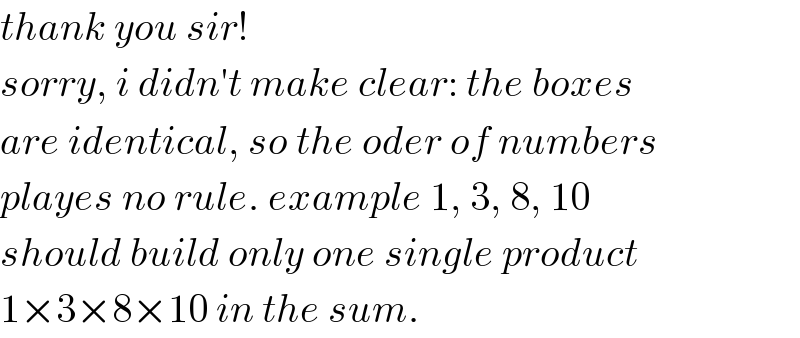
$${thank}\:{you}\:{sir}! \\ $$$${sorry},\:{i}\:{didn}'{t}\:{make}\:{clear}:\:{the}\:{boxes} \\ $$$${are}\:{identical},\:{so}\:{the}\:{oder}\:{of}\:{numbers} \\ $$$${playes}\:{no}\:{rule}.\:{example}\:\mathrm{1},\:\mathrm{3},\:\mathrm{8},\:\mathrm{10} \\ $$$${should}\:{build}\:{only}\:{one}\:{single}\:{product} \\ $$$$\mathrm{1}×\mathrm{3}×\mathrm{8}×\mathrm{10}\:{in}\:{the}\:{sum}. \\ $$
Commented by mr W last updated on 10/Apr/20

$${maybe}\:{it}'{s}\:{better}\:{if}\:{i}\:{had}\:{expressed}\:{the} \\ $$$${question}\:{like}\:{this}: \\ $$$${a}\:{box}\:{contains}\:{the}\:{numbers}\:\mathrm{1},\mathrm{2},\mathrm{3},...,{n}. \\ $$$${four}\:{numbers}\:{are}\:{drawn}\:{from}\:{the} \\ $$$${box}\:{and}\:{multiplicated}\:{with}\:{each}\:{other} \\ $$$${to}\:{build}\:{a}\:{product}.\:{find}\:{the}\:{sum}\:{of} \\ $$$${the}\:{products}\:{of}\:{all}\:{possible}\:{combinations}. \\ $$
Commented by jagoll last updated on 10/Apr/20

$$\left(\mathrm{1}.\mathrm{2}.\mathrm{3}.\mathrm{4}\right)+\left(\mathrm{1}.\mathrm{3}.\mathrm{4}.\mathrm{5}\right)+\left(\mathrm{1}.\mathrm{4}.\mathrm{5}.\mathrm{6}\right)+... \\ $$$$\left(\left(\mathrm{n}−\mathrm{3}\right).\left(\mathrm{n}−\mathrm{2}\right).\left(\mathrm{n}−\mathrm{1}\right).\mathrm{n}\right)\:\mathrm{like}\:\mathrm{this}? \\ $$
Commented by mr W last updated on 10/Apr/20

$${yes}. \\ $$
Commented by jagoll last updated on 10/Apr/20

$$\mathrm{i}\:\mathrm{don}'\mathrm{t}\:\mathrm{have}\:\mathrm{idea}\:\mathrm{sir}\:.\:\mathrm{how}\:\mathrm{to} \\ $$$$\mathrm{solve}\:\mathrm{it}? \\ $$
Commented by Tony Lin last updated on 10/Apr/20
![first consider Σ_(a≠b) ab Σ_(a≠b) ab =1×2+1×3+∙∙∙+1×n +2×1+2×3+∙∙∙+2×n ∙∙∙ +n×1+n×2+∙∙∙+n(n−1)r =1[((n(n+1))/2)]−1^2 +2[((n(n+1))/2)]−2^2 +∙∙∙ +n[((n(n+1))/2)]−n^2 =[((n(n+1))/2)]^2 −((n(n+1)(2n+1))/6) =((n(n−1)(n+1)(3n+2))/(12)) Σ_(a≠b≠c) abc =1×2×3+1×2×4+∙∙∙+1×2×n +1×3×2+1×3×4+∙∙∙+1×n(n−1) ∙∙∙ +1×n×2+1×n×3+∙∙∙+1×n(n−1) ∙∙∙and Σ2×∙∙∙ Σ3×∙∙∙ to Σn×∙∙∙ =((n(n−1)(n+1)(3n+2))/(12))−2[((n(n+1))/2)−1^2 ] +((n(n−1)(n+1)(3n+2))/(12))−2[((2n(n+1))/2)−2^2 ] ∙∙∙ +((n(n−1)(n+1)(3n+2))/(12))−2[((n^2 (n+1))/2)−n^2 ] =((n^2 (n−1)(n+1)(3n+2))/(12))−((2n(n−1)(n+1)(3n+2))/(12)) =((n(n−1)(n−2)(n+1)(3n+2))/(12)) Σ_(a≠b≠c≠d) abcd =1×2×3×4+1×2×3×5+∙∙∙+1×2×3×n +1×2×4×3+1×2×4×5+∙∙∙+1×2×4×n ∙∙∙ +1×2×n×3+1×2×n×4+∙∙∙+1×2×n(n−1) ∙∙∙and Σ1×3×∙∙∙to Σ1×n×∙∙∙ and Σ2×∙∙∙ to Σn×∙∙∙ =((n(n−1)(n−2)(n+1)(3n+2))/(12)) −3{((n(n−1)(n+1)(3n+2))/(12))−2[((n(n+1))/2)−1^2 ]} +((n(n−1)(n−2)(n+1)(3n+2))/(12)) −3{((n(n−1)(n+1)(3n+2))/(12))−2[((2n(n+1))/2)−2^2 ] +∙∙∙ =((n^2 (n−1)(n−2)(n+1)(3n+2))/(12)) −3[((n^2 (n−1)(n+1)(3n+2))/(12))−((2n(n−1)(n+1)(3n+2))/(12))] =((n^2 (n−1)(n−2)(n+1)(3n+2))/(12)) − ((3n(n−1)(n−2)(n+1)(3n+2))/(12)) =((n(n−1)(n−2)(n−3)(n+1)(3n+2))/(12)) from the rule Σ_(a_1 ≠a_2 ≠a_3 ∙∙∙≠a_k ) Π_(j=1) ^k a_j ,1<k<n =((P_k ^n (n+1)(3n+2))/(12)) , P_k ^n =C_k ^n ×k!](Q88387.png)
$${first}\:{consider}\:\underset{{a}\neq{b}} {\sum}{ab} \\ $$$$\underset{{a}\neq{b}} {\sum}{ab} \\ $$$$=\mathrm{1}×\mathrm{2}+\mathrm{1}×\mathrm{3}+\centerdot\centerdot\centerdot+\mathrm{1}×{n} \\ $$$$+\mathrm{2}×\mathrm{1}+\mathrm{2}×\mathrm{3}+\centerdot\centerdot\centerdot+\mathrm{2}×{n} \\ $$$$\centerdot\centerdot\centerdot \\ $$$$+{n}×\mathrm{1}+{n}×\mathrm{2}+\centerdot\centerdot\centerdot+{n}\left({n}−\mathrm{1}\right){r} \\ $$$$=\mathrm{1}\left[\frac{{n}\left({n}+\mathrm{1}\right)}{\mathrm{2}}\right]−\mathrm{1}^{\mathrm{2}} +\mathrm{2}\left[\frac{{n}\left({n}+\mathrm{1}\right)}{\mathrm{2}}\right]−\mathrm{2}^{\mathrm{2}} +\centerdot\centerdot\centerdot \\ $$$$+{n}\left[\frac{{n}\left({n}+\mathrm{1}\right)}{\mathrm{2}}\right]−{n}^{\mathrm{2}} \\ $$$$=\left[\frac{{n}\left({n}+\mathrm{1}\right)}{\mathrm{2}}\right]^{\mathrm{2}} −\frac{{n}\left({n}+\mathrm{1}\right)\left(\mathrm{2}{n}+\mathrm{1}\right)}{\mathrm{6}} \\ $$$$=\frac{{n}\left({n}−\mathrm{1}\right)\left({n}+\mathrm{1}\right)\left(\mathrm{3}{n}+\mathrm{2}\right)}{\mathrm{12}} \\ $$$$\underset{{a}\neq{b}\neq{c}} {\sum}{abc} \\ $$$$=\mathrm{1}×\mathrm{2}×\mathrm{3}+\mathrm{1}×\mathrm{2}×\mathrm{4}+\centerdot\centerdot\centerdot+\mathrm{1}×\mathrm{2}×{n} \\ $$$$+\mathrm{1}×\mathrm{3}×\mathrm{2}+\mathrm{1}×\mathrm{3}×\mathrm{4}+\centerdot\centerdot\centerdot+\mathrm{1}×{n}\left({n}−\mathrm{1}\right) \\ $$$$\centerdot\centerdot\centerdot \\ $$$$+\mathrm{1}×{n}×\mathrm{2}+\mathrm{1}×{n}×\mathrm{3}+\centerdot\centerdot\centerdot+\mathrm{1}×{n}\left({n}−\mathrm{1}\right) \\ $$$$\centerdot\centerdot\centerdot{and}\:\Sigma\mathrm{2}×\centerdot\centerdot\centerdot\:\Sigma\mathrm{3}×\centerdot\centerdot\centerdot\:{to}\:\Sigma{n}×\centerdot\centerdot\centerdot \\ $$$$=\frac{{n}\left({n}−\mathrm{1}\right)\left({n}+\mathrm{1}\right)\left(\mathrm{3}{n}+\mathrm{2}\right)}{\mathrm{12}}−\mathrm{2}\left[\frac{{n}\left({n}+\mathrm{1}\right)}{\mathrm{2}}−\mathrm{1}^{\mathrm{2}} \right] \\ $$$$+\frac{{n}\left({n}−\mathrm{1}\right)\left({n}+\mathrm{1}\right)\left(\mathrm{3}{n}+\mathrm{2}\right)}{\mathrm{12}}−\mathrm{2}\left[\frac{\mathrm{2}{n}\left({n}+\mathrm{1}\right)}{\mathrm{2}}−\mathrm{2}^{\mathrm{2}} \right] \\ $$$$\centerdot\centerdot\centerdot \\ $$$$+\frac{{n}\left({n}−\mathrm{1}\right)\left({n}+\mathrm{1}\right)\left(\mathrm{3}{n}+\mathrm{2}\right)}{\mathrm{12}}−\mathrm{2}\left[\frac{{n}^{\mathrm{2}} \left({n}+\mathrm{1}\right)}{\mathrm{2}}−{n}^{\mathrm{2}} \right] \\ $$$$=\frac{{n}^{\mathrm{2}} \left({n}−\mathrm{1}\right)\left({n}+\mathrm{1}\right)\left(\mathrm{3}{n}+\mathrm{2}\right)}{\mathrm{12}}−\frac{\mathrm{2}{n}\left({n}−\mathrm{1}\right)\left({n}+\mathrm{1}\right)\left(\mathrm{3}{n}+\mathrm{2}\right)}{\mathrm{12}} \\ $$$$=\frac{{n}\left({n}−\mathrm{1}\right)\left({n}−\mathrm{2}\right)\left({n}+\mathrm{1}\right)\left(\mathrm{3}{n}+\mathrm{2}\right)}{\mathrm{12}} \\ $$$$\underset{{a}\neq{b}\neq{c}\neq{d}} {\sum}{abcd} \\ $$$$=\mathrm{1}×\mathrm{2}×\mathrm{3}×\mathrm{4}+\mathrm{1}×\mathrm{2}×\mathrm{3}×\mathrm{5}+\centerdot\centerdot\centerdot+\mathrm{1}×\mathrm{2}×\mathrm{3}×{n} \\ $$$$+\mathrm{1}×\mathrm{2}×\mathrm{4}×\mathrm{3}+\mathrm{1}×\mathrm{2}×\mathrm{4}×\mathrm{5}+\centerdot\centerdot\centerdot+\mathrm{1}×\mathrm{2}×\mathrm{4}×{n} \\ $$$$\centerdot\centerdot\centerdot \\ $$$$+\mathrm{1}×\mathrm{2}×{n}×\mathrm{3}+\mathrm{1}×\mathrm{2}×{n}×\mathrm{4}+\centerdot\centerdot\centerdot+\mathrm{1}×\mathrm{2}×{n}\left({n}−\mathrm{1}\right) \\ $$$$\centerdot\centerdot\centerdot{and}\:\Sigma\mathrm{1}×\mathrm{3}×\centerdot\centerdot\centerdot{to}\:\Sigma\mathrm{1}×{n}×\centerdot\centerdot\centerdot \\ $$$${and}\:\Sigma\mathrm{2}×\centerdot\centerdot\centerdot\:{to}\:\Sigma{n}×\centerdot\centerdot\centerdot \\ $$$$=\frac{{n}\left({n}−\mathrm{1}\right)\left({n}−\mathrm{2}\right)\left({n}+\mathrm{1}\right)\left(\mathrm{3}{n}+\mathrm{2}\right)}{\mathrm{12}} \\ $$$$−\mathrm{3}\left\{\frac{{n}\left({n}−\mathrm{1}\right)\left({n}+\mathrm{1}\right)\left(\mathrm{3}{n}+\mathrm{2}\right)}{\mathrm{12}}−\mathrm{2}\left[\frac{{n}\left({n}+\mathrm{1}\right)}{\mathrm{2}}−\mathrm{1}^{\mathrm{2}} \right]\right\} \\ $$$$+\frac{{n}\left({n}−\mathrm{1}\right)\left({n}−\mathrm{2}\right)\left({n}+\mathrm{1}\right)\left(\mathrm{3}{n}+\mathrm{2}\right)}{\mathrm{12}} \\ $$$$−\mathrm{3}\left\{\frac{{n}\left({n}−\mathrm{1}\right)\left({n}+\mathrm{1}\right)\left(\mathrm{3}{n}+\mathrm{2}\right)}{\mathrm{12}}−\mathrm{2}\left[\frac{\mathrm{2}{n}\left({n}+\mathrm{1}\right)}{\mathrm{2}}−\mathrm{2}^{\mathrm{2}} \right]\right. \\ $$$$+\centerdot\centerdot\centerdot \\ $$$$=\frac{{n}^{\mathrm{2}} \left({n}−\mathrm{1}\right)\left({n}−\mathrm{2}\right)\left({n}+\mathrm{1}\right)\left(\mathrm{3}{n}+\mathrm{2}\right)}{\mathrm{12}} \\ $$$$−\mathrm{3}\left[\frac{{n}^{\mathrm{2}} \left({n}−\mathrm{1}\right)\left({n}+\mathrm{1}\right)\left(\mathrm{3}{n}+\mathrm{2}\right)}{\mathrm{12}}−\frac{\mathrm{2}{n}\left({n}−\mathrm{1}\right)\left({n}+\mathrm{1}\right)\left(\mathrm{3}{n}+\mathrm{2}\right)}{\mathrm{12}}\right] \\ $$$$=\frac{{n}^{\mathrm{2}} \left({n}−\mathrm{1}\right)\left({n}−\mathrm{2}\right)\left({n}+\mathrm{1}\right)\left(\mathrm{3}{n}+\mathrm{2}\right)}{\mathrm{12}} \\ $$$$−\:\frac{\mathrm{3}{n}\left({n}−\mathrm{1}\right)\left({n}−\mathrm{2}\right)\left({n}+\mathrm{1}\right)\left(\mathrm{3}{n}+\mathrm{2}\right)}{\mathrm{12}}\: \\ $$$$=\frac{{n}\left({n}−\mathrm{1}\right)\left({n}−\mathrm{2}\right)\left({n}−\mathrm{3}\right)\left({n}+\mathrm{1}\right)\left(\mathrm{3}{n}+\mathrm{2}\right)}{\mathrm{12}} \\ $$$${from}\:{the}\:{rule}\: \\ $$$$\underset{{a}_{\mathrm{1}} \neq{a}_{\mathrm{2}} \neq{a}_{\mathrm{3}} \centerdot\centerdot\centerdot\neq{a}_{{k}} } {\sum}\underset{{j}=\mathrm{1}} {\overset{{k}} {\prod}}{a}_{{j}} \:,\mathrm{1}<{k}<{n} \\ $$$$=\frac{{P}_{{k}} ^{{n}} \left({n}+\mathrm{1}\right)\left(\mathrm{3}{n}+\mathrm{2}\right)}{\mathrm{12}}\:,\:{P}_{{k}} ^{{n}} ={C}_{{k}} ^{{n}} ×{k}! \\ $$
Commented by Tony Lin last updated on 10/Apr/20
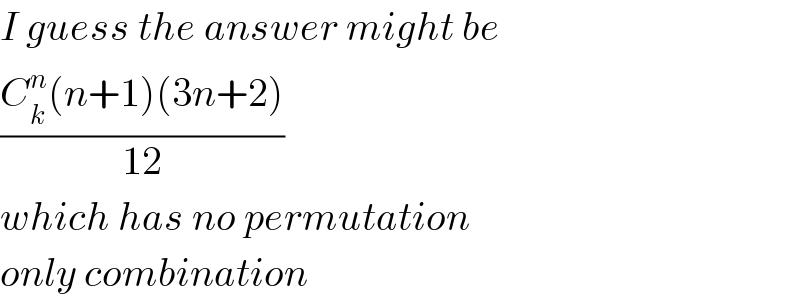
$${I}\:{guess}\:{the}\:{answer}\:{might}\:{be} \\ $$$$\frac{{C}_{{k}} ^{{n}} \left({n}+\mathrm{1}\right)\left(\mathrm{3}{n}+\mathrm{2}\right)}{\mathrm{12}} \\ $$$${which}\:{has}\:{no}\:{permutation} \\ $$$${only}\:{combination} \\ $$
Commented by mr W last updated on 10/Apr/20
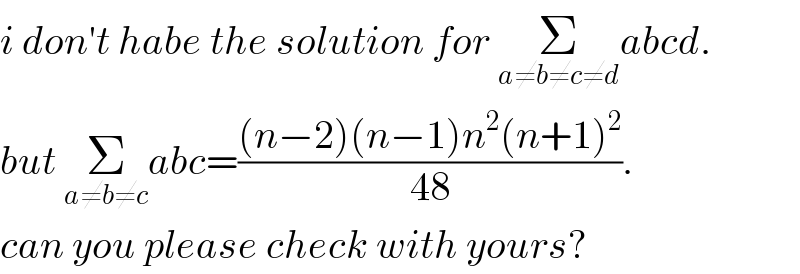
$${i}\:{don}'{t}\:{habe}\:{the}\:{solution}\:{for}\:\underset{{a}\neq{b}\neq{c}\neq{d}} {\sum}{abcd}. \\ $$$${but}\:\underset{{a}\neq{b}\neq{c}} {\sum}{abc}=\frac{\left({n}−\mathrm{2}\right)\left({n}−\mathrm{1}\right){n}^{\mathrm{2}} \left({n}+\mathrm{1}\right)^{\mathrm{2}} }{\mathrm{48}}. \\ $$$${can}\:{you}\:{please}\:{check}\:{with}\:{yours}? \\ $$
Commented by Tony Lin last updated on 10/Apr/20
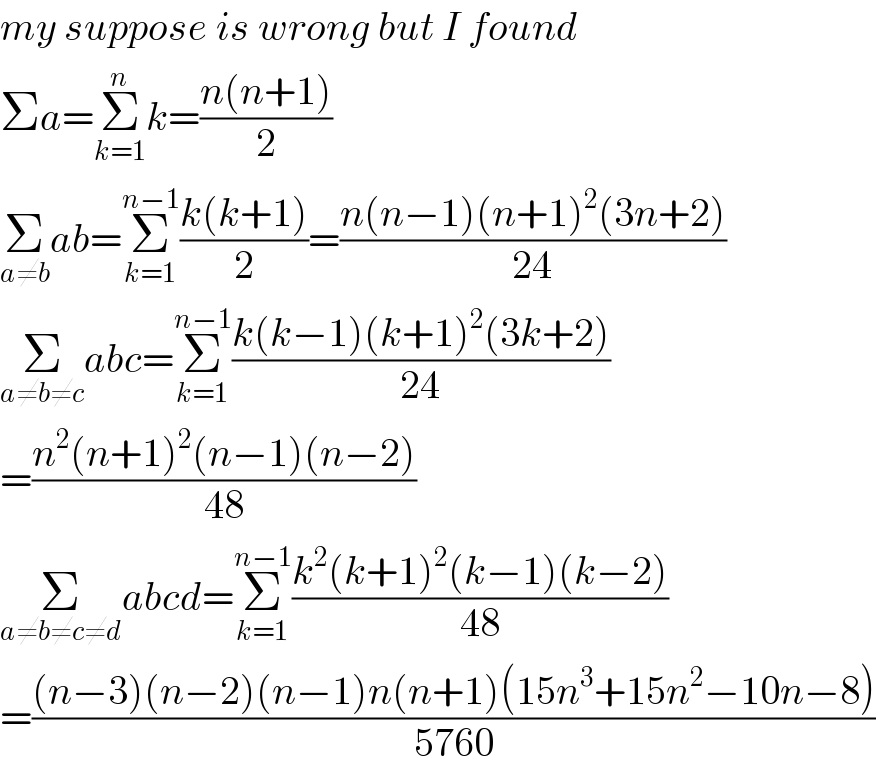
$${my}\:{suppose}\:{is}\:{wrong}\:{but}\:{I}\:{found}\: \\ $$$$\Sigma{a}=\underset{{k}=\mathrm{1}} {\overset{{n}} {\sum}}{k}=\frac{{n}\left({n}+\mathrm{1}\right)}{\mathrm{2}} \\ $$$$\underset{{a}\neq{b}} {\sum}{ab}=\underset{{k}=\mathrm{1}} {\overset{{n}−\mathrm{1}} {\sum}}\frac{{k}\left({k}+\mathrm{1}\right)}{\mathrm{2}}=\frac{{n}\left({n}−\mathrm{1}\right)\left({n}+\mathrm{1}\right)^{\mathrm{2}} \left(\mathrm{3}{n}+\mathrm{2}\right)}{\mathrm{24}} \\ $$$$\underset{{a}\neq{b}\neq{c}} {\sum}{abc}=\underset{{k}=\mathrm{1}} {\overset{{n}−\mathrm{1}} {\sum}}\frac{{k}\left({k}−\mathrm{1}\right)\left({k}+\mathrm{1}\right)^{\mathrm{2}} \left(\mathrm{3}{k}+\mathrm{2}\right)}{\mathrm{24}} \\ $$$$=\frac{{n}^{\mathrm{2}} \left({n}+\mathrm{1}\right)^{\mathrm{2}} \left({n}−\mathrm{1}\right)\left({n}−\mathrm{2}\right)}{\mathrm{48}} \\ $$$$\underset{{a}\neq{b}\neq{c}\neq{d}} {\sum}{abcd}=\underset{{k}=\mathrm{1}} {\overset{{n}−\mathrm{1}} {\sum}}\frac{{k}^{\mathrm{2}} \left({k}+\mathrm{1}\right)^{\mathrm{2}} \left({k}−\mathrm{1}\right)\left({k}−\mathrm{2}\right)}{\mathrm{48}} \\ $$$$=\frac{\left({n}−\mathrm{3}\right)\left({n}−\mathrm{2}\right)\left({n}−\mathrm{1}\right){n}\left({n}+\mathrm{1}\right)\left(\mathrm{15}{n}^{\mathrm{3}} +\mathrm{15}{n}^{\mathrm{2}} −\mathrm{10}{n}−\mathrm{8}\right)}{\mathrm{5760}} \\ $$
Commented by mr W last updated on 10/Apr/20

$${very}\:{interesting},\:{thanks}\:{alot}\:{sir}! \\ $$
